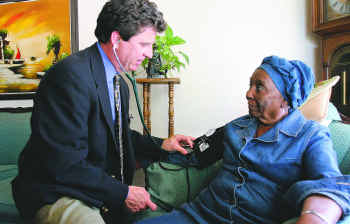House Calls Make Cents
 Every Tuesday afternoon I have the privilege of hanging out with my buddy Jim Walton. During this time we enter the homes of very special people in need and I get to observe, and sometime participate in, the awesome responsibility of providing care to those among the most in need.
Every Tuesday afternoon I have the privilege of hanging out with my buddy Jim Walton. During this time we enter the homes of very special people in need and I get to observe, and sometime participate in, the awesome responsibility of providing care to those among the most in need.This work is starting to get some attention. Last weekend the Dallas Morning News Business section carried a story on this important work. It featured Jim with a very special patient, Ms. Ransom.
She is a pillar in the Roseland Homes community and has been an activist for most of her 86 years. She is also dying of cancer and I have the unique privilege of getting to know her better as she transitions ‘home’.
Very early in our house call experience I inquired if this activity made economic sense. I knew that in private practice a family physician must see around 22 patients a day to be fiancially viable. Jim and I only see around 5 in half a day. I haven’t done the complete analysis however after about 18 months of this I can see that this is indeed viable. Jim sees very difficult patients, most are quadriplegics who, while for the most part are stable, need his monthly visits and weekly visits from our Community Health Workers (CHW). The uninsured (indigent) do have access to health care, they get it in the Emergency Departments (EDs) of large hospitals all over the country. In Dallas this costs the hospital about $1,000 per ED visit. If they are admitted through the ED, and because they don’t have a regular physician this is how the uninsured get admitted, it costs the hospital a shade over $1,000 per day. It is very unusual for one of Jim’s patients to need to go to the ED or get admitted. In fact since I’ve been working with Jim I believe only one has been admitted and one another has had to go to the ED. He is a quad who had to be transported because of complications from changing his catheter. The ambulance bill alone was $690 – $600 for the pick up and $10 for each of the 9 miles. His ED bill was around $690 and incurred other hospital fees of about $3,000.
Quads in general are fairly stable, their big risks are wounds on their butts (from pressure) and urinary tract infections (UTIs). Keeping these folks out of the hospital makes economic sense and it is really cool to be a part of these folks lives on this level.
